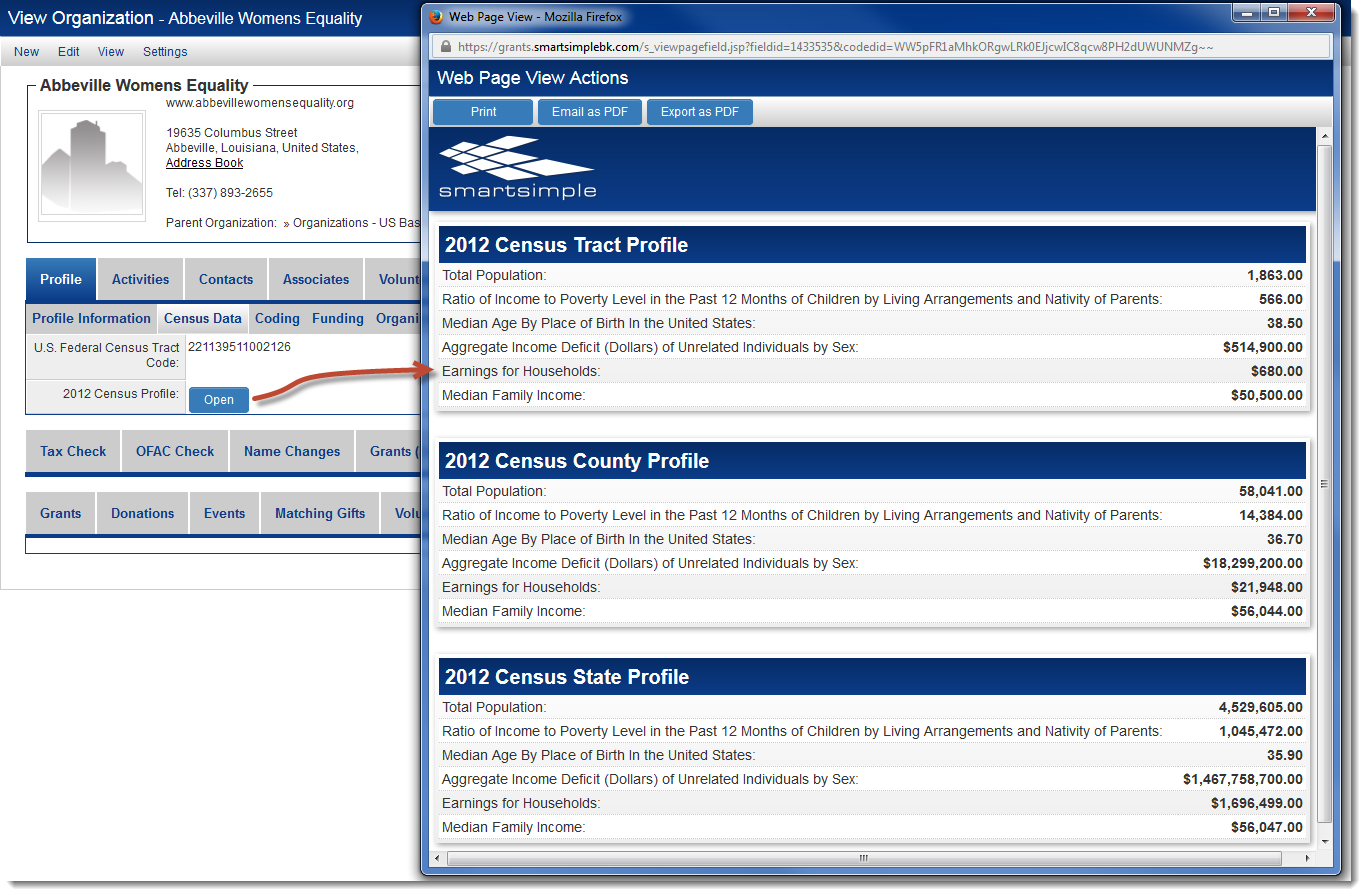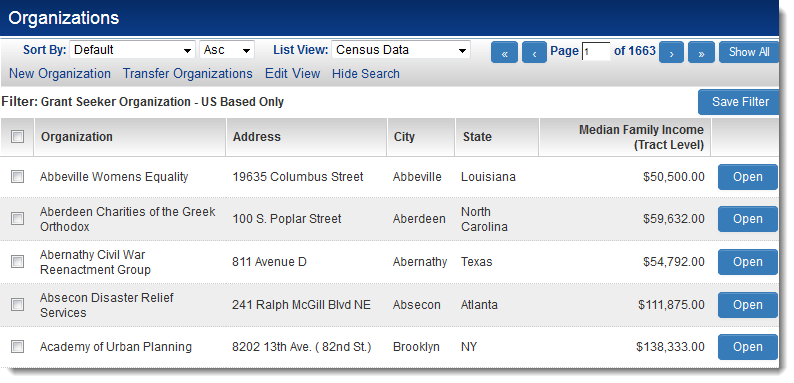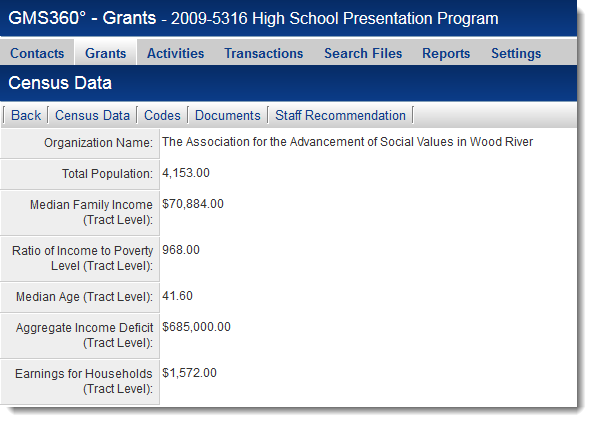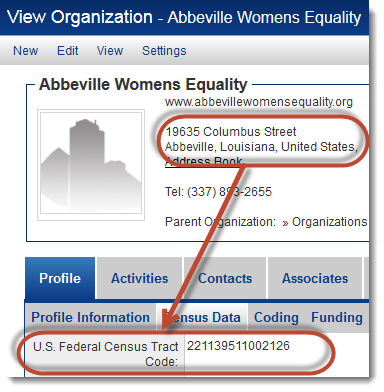Census Integration
Contents
[hide]Overview
SmartSimple integrates with the U.S. Census online database to provide our clients with the ability to access the most up-to-date geographically-relevant data pertaining to their clients.
Census data is provided at three different levels: Tract, County and State. Census Tracts are the lowest level of geographic region for which census data can be returned.
In the example below, a Web Page View has been configured to display all three levels of census data on an organization profile.
Census Data can be referenced anywhere in SmartSimple:
...on a list view:
...on a record:
...or anywhere else. Data from the U.S. census can also be used to drive branching logic on SmartSimple workflows, or perform other calculations.
Returning the Tract Code
SmartSimple's Census Integration works by deriving the census block number from your organization or contact's address details. The census block number is a 15-digit code that incorporates - reading from left to right - the location's two-digit State code, three-digit County code, and six-digit census tract code.
In the above example:
- 22 is the State code for Louisiana,
- 113 is the County code for Vermilion Parish and
- 951100 is the census tract code for the address of Abbeville Womens Equality.
FIPS Code Syntax
In the above example, the census block number for Abbeville Womens Equality's location is returned using the following variable:
- @ssGet(FFD,FIPS;;@address@ @city@ @state@)@
FFD stands for "Federal Financial Data" and FIPS stands for Federal Information Processing Standards.
On a record, the census block number can be returned for an associated Organization by using:
- @ssGet(FFD,FIPS;;@client.address@ @client.city@ @client.state@)@
Note: The U.S. Federal Communications Commission writes: "Form 477 requires broadband providers to submit data on a census-tract basis. For the filing of data as of December 31, 2011, or later dates, the Form 477 electronic filing system will recognize as valid the combinations of County and Census tract codes from the Year 2010 Census." - from http://transition.fcc.gov/form477/censustracts.html Returning the FIPS code makes it easy for SmartSimple's clients to submit forms electronically to the FCC.
Returning Census Data
Detailed census data can be retrieved at three levels, the tract, county, and state.
Census Data Variable Syntax
- @ssGet(FFD,Profile;;year;;Address or FIPS code;;level;;[[template]])@
Where:
- Profile is a constant.
- year is the census year from which the data is returned. Accepts 2012, 2011, and 2010
- Address or FIPS code accepts
- a variable reference to the address, such as @address@ @city@ @state@
- the 15-digit census block number
- level accepts three values, one of
- tract
- county or
- state
- template is the type of census data to be returned. Over 45,000 different database fields can be reported on from the online census database. Examples are listed below. Note that the template should be enclosed within a double set of square brackets (e.g., [[B01003_001E]] will return the Total Population)
Example: In the example at the top of the page, the Median Family Income for Louisiana in 2012 ($56,047.00) is returned using
- @ssGet(FFD,Profile;;2012;;@address@ @city@ @state@;;state;;[[B19113_001E]])@
Characteristics Available in the Census Templates
A variety of datasets are available from the Census Bureau's templates. Using the templates, you can return census data broken out by the following categories:
- Demographic Characteristics
- Sex
- Age
- Race
- Hispanic Origin
- Social Characteristics
- Education
- Marital Status
- Fertility
- Grandparent Caregivers
- Veterans
- Disability Status
- Health Insurance
- Place of Birth
- Citizenship
- Year of Entry
- Language Spoken at Home
- Ancestry / Tribal Affiliation
- Economic Characteristics
- Income
- Benefits
- Employment Status
- Occupation
- Industry
- Commuting to Work
- Place of Work
- Housing Characteristics
- Housing Tenure
- Occupancy & Structure
- Housing Value
- Taxes & Insurance
- Utilities
- Mortgage/Monthly Rent
List of Commonly-used Templates
The census data templates used in the illustration at the top of the page are as follows:
| Template Name | Description |
| B01003_001E | Total Population |
| B05010_001E | Ratio of Income to Poverty Level in the Past 12 Months of Children by Living Arrangements and Nativity of Parents |
| B06002_001E | Median Age By Place of Birth In the United States |
| B17008_001E | Aggregate Income Deficit (Dollars) of Unrelated Individuals by Sex |
| B19051_001E | Earnings for Households |
| B19113_001E | Median Family Income |
A full list of the census data templates can be found here: List of census templates



